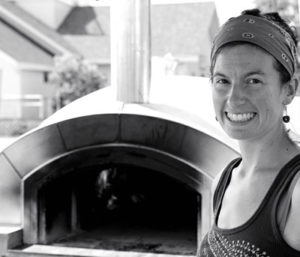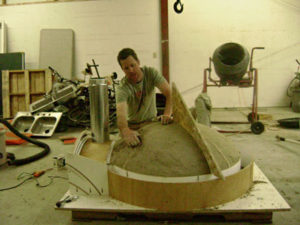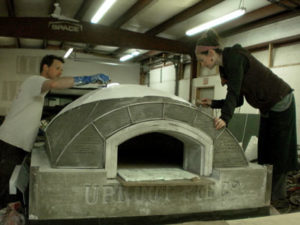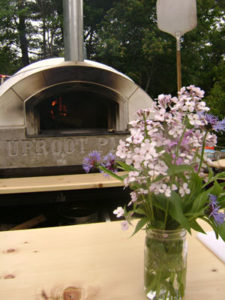 |
| Chef Jessica Shepard with the Uproot Pie Company wood-fired oven, which travels to farmers’ markets in Camden, Rockland and Union to sell pizza. Elizabeth Thomas photo. |
By Polly Shyka
Imagine a harborside park where you could stroll through tents overflowing with produce grown by your favorite local farmers. Add to that the smell of pizza and wood smoke. Imagine these pizzas are made with market-procured toppings, fresh dough and served hot from a stunning trailer-mounted wood-fired oven. Sound amazing? It is – and it is a reality at three Maine farmers’ markets. The Uproot Pie Company began selling its “wood-fired pizzas, bagels and rustic treats on the move” last summer and is now in its second successful season.
History
When Uproot owner-baker Jessica Shepard was choosing an internship during her last semester at the Portland, Oregon, Western Culinary Institute in 2006 and her advisors offered a booklet of contacts at high end hotels in large cities and resort locales, she said, “No, thanks.” Shepard wanted a destination and a culinary genre much more off the beaten path. She asked her advisors for contacts of wood-fired oven bakeries. They had none, so Shepard made her own. Through The Bread Bakers Guild of America, she found a boys’ camp in rural North Carolina that was seeking a summer baker to feed its wood-fired oven and, of course, its campers.
“I am a girl … but I am looking for an internship,” Shepard told the camp director. The director contacted a local wood-fired bakery and forged a mentorship between Flat Rock Village Bakery’s owner, Scott Unfried, and Shepard. She flew to North Carolina, moved into a living space behind the bakery and began working at both the camp and in Flat Rock’s small but bustling bakery.
“I wasn’t interested in the pizzas at the time,” she says, “but I learned everything about the ovens, bread and pastries.”
 |
| Andy White works on the wood-fired oven for the Uproot Pie Company. Jessica Shepard photos. |
 |
After the summer internship, Shepard returned to Portland, Oregon, and applied for a job with Mark Doxtader at Tastebud, a mobile wood-fired bakery specializing in selling bagels at farmers’ markets. Shepard soon was running the entire bagel operation, rising at 3 a.m. on Saturdays to prepare for market.
“It was the most insane job,” she says. “We baked 80 dozen bagels on cedar planks in the oven. I would get there, soak my planks, start my oven and then bake the bagels that [others] had mixed and shaped the night before.”
When Shepard’s mother called saying a cottage was for rent in her native Cushing, Maine, the die was cast for Uproot Pie Company’s beginnings. In January 2011, Shepard and her boyfriend, Andy White, were looking for a warehouse in Rockland to rent in order to open a wood-fired pizza and beer place.
“We wanted a place where the creative community could come together. That fell through, thank goodness,” she says. With true entrepreneurial and engineering spirit, White said, “Let’s just make it mobile. I will build it.”
The Uproot Oven
Shepard’s father had an empty workshop in Rockland where White worked. First he built the 8-foot trailer, then the 42-inch (hearth diameter) Neapolitan-style oven. White, a graduate of Massachusetts College of Art and “a maker of everything,” says Shepard, built the trailer and oven from scratch, without blueprints.
“It was incredible. He drew it all on a chalkboard and just figured it out.”
The trailer is equipped with its own brakes, as the finished oven weighs 3,000 pounds. The trailer also holds a wash station with 85-degree water and four sinks – one for handwashing and three for dishes. As a traveling restaurant, every detail had to meet state health standards.
Once the trailer frame was welded together and painted, the concrete base of the oven was poured into plywood forms on the back of the trailer. Even the company name was included in the form work, with letters cut from rigid foam board and glued to the inside of one form.
White lined the oven cooking surface with firebricks and included an air vent that would eventually be right by the oven door. He then made the igloo-shaped form onto which 4 inches of refractory cement would be poured.
White and Shepard had researched trailer-mounted ovens, including the “rickety but awesome” one on which Shepard learned in Oregon.
“The brick ones were crumbling,” says Shepard. “So we decided to cast this one out of refractory cement to withstand the rigors of driving on Maine’s roads,” adds White.
 |
| The finished oven. Jessica Shepard photo. |
Knock-outs were included for the 4-foot stainless chimney and cave-like mouth. The couple and their friend Daniel Bennett layered on the cement and troweled it smooth. After curing for seven days, the monolith was ready to be hoisted off its form and lowered onto the firebrick base on the trailer. Then the oven was insulated with rock wool and surfaced.
“The weatherproofing finish was where I got to put on my sculptor’s hat,” says White. He describes standing back from a pile of scrap stainless steel rods in a corner of the shop and getting the idea for the unique and beautiful finish. He welded the stainless rods together right on the oven, then using expanded metal lath as a base, he applied stucco between the various geometric shapes. The oven was ready for its inaugural firing and for its first market, just four days later.
Farmers’ Markets
In the snowy 2011 January, before the oven or trailer had even been started, Shepard applied to three midcoast farmers’ markets: Camden (Wednesday and Saturday), Rockland (Thursday) and Union (Friday). She brought bagels as samples to her interviews.
“I had every intention of making bagels in the mornings before the markets,” says Shepard. “I didn’t realize how popular the pizzas were going to be. I thought I could do both. Someday, maybe!
“I show up at each market morning,” she continues, “and get my ingredients from the vendors as they set up their tables. I chop my vegetables in the ocean breeze! Those were the most magical moments of each market.” She starts her fire, then washes and chops produce, meats and cheeses and readies her prep table.
As word spread, Shepard and her assistant, Sophie Meltzer, would sling and bake 30 to 90 pizzas in each three-hour market.
“It was insane. I had planned on selling 20 pizzas per market.”
The feedback was enthusiastic. One of the most encouraging comments came from Rockland market manager Caitlin Hunter, farmer-owner of Appleton Creamery. Shepard recalls her noting that Uproot had changed the dynamic of this market, bringing it alive at noon. As word of the wood-fired pizza spread, many Rockland workers and inhabitants found the market for the first time and returned weekly.
“Even executives from Boston Financial were coming to the market for lunch,” says Shepard.
“People have to wait for pizzas. We are just that busy. The good side of that situation is that while folks wait, they stroll around to all the farmers and shop.”
Uproot offers three pizzas per market, each showcasing the fresh, seasonal produce available from neighboring vendors. Shepard writes the ingredients and source farms on a blackboard by the oven.
“People tell me, ‘You should open a restaurant,’ but I am so content. I really feel like I am a part of the markets. My rent is farmers’ market dues. This is the most rewarding thing I have ever done.”
Shepard has found her perfect bakery business model, visiting with customers while she bakes and joining a farmers’ community.
“I used to ask myself. ‘Am I ready to give up a lot to be a baker?’ Most bakers work insane hours and are inside all day.” Shepard’s plein air eatery works for her customers, for the markets and for her.
On-farm Collaboration
In midsummer 2011, Shepard and White teamed up with Oyster River Winergrowers of Warren to offer twice monthly, on-farm evening gatherings, for added visibility for Uproot and Winegrowers, and for the creative community to come together. The gatherings feature Warren-made wines. Uproot’s oven is parked in the barnyard, people mingle in Oyster River Winegrowers’ renovated barn, and Stone Fox Creamery ice cream tops it all off.
Oyster River Winegrowers is owned by Allie Willenbrink and Brian Smith, young and ambitious draft horse teamsters and viticulturists. They have 3 acres of vines and, in 2011, released their first wine, The Villager White.
Uproot’s Future
Shepard reflects on Uproot’s first year with barely contained joy.
“I loved it. The oven worked perfectly and the only thing we need to improve is our ability to refrigerate doughs.” On a hot summer day, despite being packed in coolers on ice, the last doughs to be baked “would be nearly over-proofed,” relates Shepard, meaning the dough had almost risen too much.
“I have gotten lots of calls to do big events. I have done a few wedding rehearsal dinners but I stress that I am casual. It has got to be a good fit.”
Shepard continues, “What I love most is the farm community in this area. I don’t want to farm myself, but I want to be a part of this community. I just did a fundraiser at Hatchet Cove Farm last year. It was the best. I have zero interest in doing fairs and large festivals like Lobsterfest, even though everyone tells me that I could make so much more money there.”
Shepard plans to add a line of sparkling juice spritzers to her market offerings this summer. Once local fruit starts coming in, she plans to make juice concentrates such as ginger-rhubarb and add it to sparkling water.
“I am still getting my feet on the ground. Nothing big,” says Shepard.
White has been concentrating on his art since building the oven.
“He has had several commissioned installations,” says Shepard, “and is now building an Uproot-style oven for a couple in western Massachusetts who want to replicate Uproot’s business model.”
Back at the markets, when people tell Shepard her pizza “is the best thing they have ever tasted,” she is likely to deflect the praise, point to the bustling market and tell customers, “It is so good because those farmers right over there picked these very greens [and other ingredients] this very morning.”
About the author: Polly Shyka farms Village Farm in Freedom with her husband, Prentice Grassi, and their three young sons.
